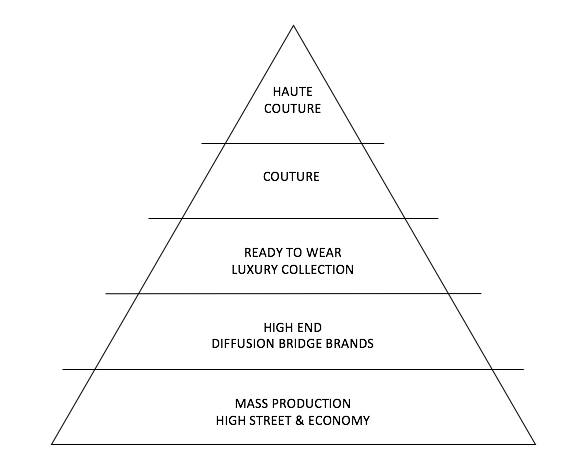FASHION MARKET LEVELS
00:56
So, every single brand or label can be separated into one category of
fashion.
Here it is
divided into a hierarchy of 5 segments, starting from Haute Couture to High
street/Economy.
Haute couture is positioned at the top of the
hierarchy. It is the most expensive and it reaches out to a very small market. You usually have to be either very rich, a royal or have the status of Kim K to wear haute couture. Haute couture houses are the major fashion
houses in the world, run by internationally famous designers such as Chanel,
Prada and Alexander McQueen. It is made to order which means it is customised pacifically to each client, therefore the great thing about haute couture is that it cannot be replicated. For a garment to be considered Haute couture,
it must meet the requirements of the French ministry of industry. Sounds super fancy, right? The
most important marketing strategy for this group is the runway shows that run
twice a year where they get the chance to present their designs to the public.
Luxury Fashion (ready to wear) comes after
couture on the hierarchy.
Brands such as Prada, Burberry and Gucci would
fall under this division.
Luxury Fashion is usually Produced but not mass
produced which means there is more control and limited availability. Usually,
the best form of promotion for this division is catwalks at Fashion weeks in
Milan, Paris and London etc. China is the largest consumer of Luxury
products, usually the consumers of the luxury brands have a high disposable
income with the market being mostly people aged 35-54.
Diffusion brands are then next, a diffusion line
is offered by a luxury brand to make it more affordable and entice a new
market, the brand having a second line ultimately makes for more money and
publicity. The diffusion line usually offers more variety than the luxury brand
as the luxury brands like to stick to their niche products in order to not
devalue their brand. The diffusion brand is supposedly meant to be 30 percent
cheaper than the luxury brand. Some examples include ‘SEE by Chloe’, ‘RED by
Valentino’ and ‘Miu Miu’ by Prada however you can argue that ‘Miu Miu’ has
become a luxury brand in itself as the price's have gone up and now they are
just as high as Prada, even though they have different target
demographics.
Bridge brands sit above the high street and
below luxury fashion. It is used as the bridge between the expensive market and
the more moderate pricing, so you could say, its the top end of the high street. COS, LK Bennett, Joseph and Whistles would be an example of a bridge brand. This audience is usually 30+ and earning
a moderate amount of disposable income.
& Lastly, the fastest moving sector in the fashion market. This is the sector in the hierarchy I buy from, High street. I mean I would love to be a luxury brand consumer. Hey, even a bridge brand consumer. But for now with my student budget I will have to stick to high street. Not that I'm complaining, I do love H&M and Zara. High street is also the fastest moving sector in the fashion market.
& Lastly, the fastest moving sector in the fashion market. This is the sector in the hierarchy I buy from, High street. I mean I would love to be a luxury brand consumer. Hey, even a bridge brand consumer. But for now with my student budget I will have to stick to high street. Not that I'm complaining, I do love H&M and Zara. High street is also the fastest moving sector in the fashion market.








0 comments